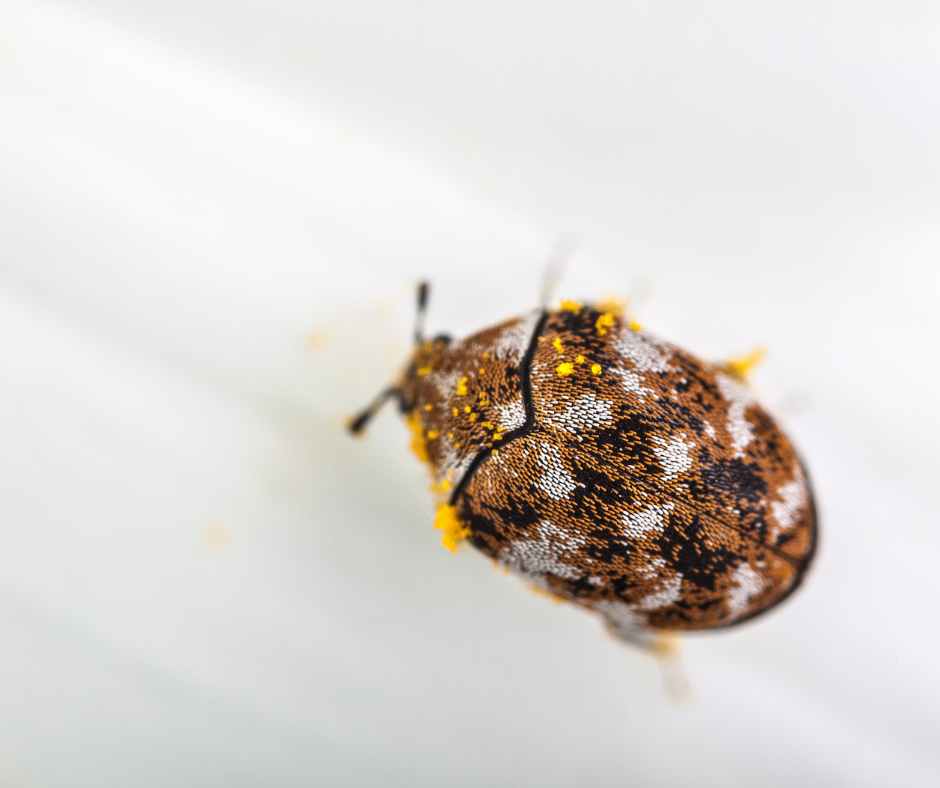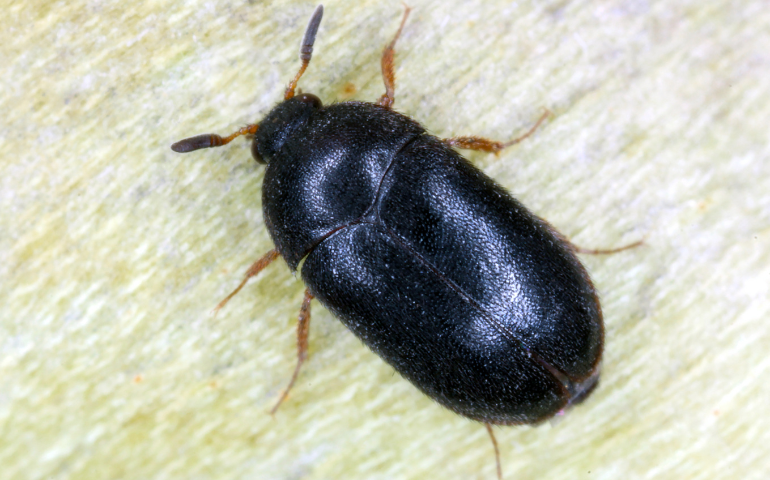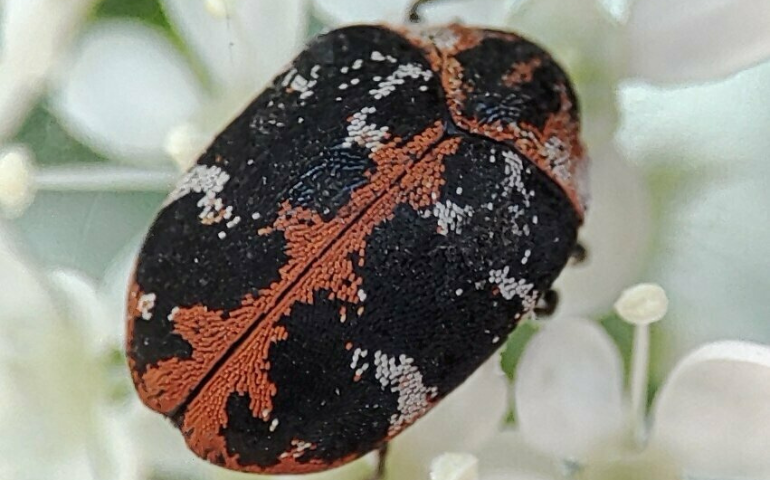Carpet Beetles
Carpet beetles are as annoying as they are varied. Technically, there are many different beetle species that can be considered carpet beetles or common house beetles. But you don’t need to talk to a variety of different pest control companies to get rid of them.
Come to Alta Pest Control in Washington, Kansas, Oklahoma, Virginia, and Texas. Our carpet beetle control specialists can create a plan to get rid of the beetles crawling around your home, regardless of their exact species. We are renowned for pest elimination methods that are safe for you, your family, and your pets, as well as for keeping our services competitively priced.
What Do Carpet Beetles Look Like?
As mentioned, carpet beetles can consist of a variety of different species. This might not be surprising since approximately 25% of all animal species are a type of beetle. However, “skin beetles” or Dermestidae are usually the most common carpet beetle that gets into homes in a number great enough to constitute an infestation.
What Kinds of Carpet Beetles Are There?

The Varied carpet beetle is a small, round beetle found throughout North America, measuring around 2 to 3 mm in length. It is easily recognized by its colorful pattern of white, brown, yellow, and black scales on its back. This species feeds on a wide variety of materials, including carpets, wool, feathers, and stored food products, making it a common household pest. Early detection and control are important to prevent damage to fabrics and other items in your home.

The Black carpet beetle is slightly larger than other carpet beetle species, ranging from 3 to 5 mm in length. Adults are shiny black or dark brown with a smooth, oval body. The larvae are long and golden-brown, with a carrot-like shape and fine bristles. Black carpet beetles are known to feed on a variety of organic materials, such as wool, fur, leather, and even dried plant matter. Infestations can cause significant damage, so proactive treatment is recommended to protect household items.

The Buffalo carpet beetle is a small, oval-shaped beetle found in North America, measuring about 2.5 to 3.5 mm in length. It has a distinctive speckled pattern on its back, featuring a mix of black, white, brown, and yellow scales. This beetle feeds on a variety of items, including carpets, clothing, and stored food products, and can cause significant damage to household fabrics and food items. Early detection and control are essential to prevent infestations.
Carpet beetles can be considered pests because their larvae feed on natural fibers, causing damage to carpets, clothing, upholstery, and other items. Controlling their populations often involves regular cleaning, proper storage of susceptible items, and, in some cases, the use of insecticides.
What causes carpet beetles?
We often find that carpet beetles are attracted to homes due to the presence of natural fibers and materials. Items such as wool, silk, fur, and feathers can draw them in. Infestations typically start when these pests make their way into your home through open windows, doors, or by being brought in on infested items.
How do I know if I have carpet beetles?
Signs of a carpet beetle infestation include the presence of small adult beetles, often found near windows. Additionally, damaged items such as carpets, clothing, and upholstery with irregular holes or patches can indicate larval feeding. Carpet beetle larvae, which are small, hairy, and carrot-shaped, may be found in dark, secluded areas. If you suspect an infestation, we recommend contacting Alta Pest Control for a thorough inspection and effective pest management strategies.
Are Carpet Beetles Harmful?
Carpet beetles are a common household pest that can cause significant damage to clothes and furniture. Their larvae feed on natural fibers, such as wool, silk, and cotton, leading to holes and other forms of damage. If left untreated, carpet beetle infestations can result in costly repairs and replacements.
The damage caused by carpet beetles can be particularly troublesome for those who own valuable clothing or furniture. Their feeding habits can result in irreparable damage to delicate fabrics and materials, making preservation and restoration difficult or impossible. Prevention and early detection are crucial in avoiding these costly and frustrating situations.
To prevent carpet beetle damage, it’s essential to regularly clean and vacuum carpets, furniture, and clothing, especially in areas where the beetles are most likely to thrive. Early detection of an infestation can also help prevent further damage and reduce the need for expensive repairs or replacements.
Carpet Beetles Cause Health Problems
Carpet beetles can pose a significant health risk to people who are allergic to them. The allergens produced by carpet beetles can cause a range of health problems, including skin irritation, itching, and respiratory issues such as asthma. These allergic reactions are typically caused by the tiny hairs or bristles on the beetle’s body, which can become airborne and inhaled by people in the vicinity.
In addition to respiratory problems, some people may experience more severe allergic reactions, including anaphylactic shock. Anaphylactic shock is a life-threatening condition that can occur when the immune system overreacts to the presence of an allergen, causing a rapid drop in blood pressure and difficulty breathing. If left untreated, anaphylactic shock can be fatal.
To avoid the health risks associated with carpet beetles, it’s important to take steps to prevent infestations and seek treatment if you experience any symptoms of an allergic reaction. This may include using allergen-proof bedding and mattress covers, vacuuming regularly, and seeking professional pest control services if necessary. If you experience severe symptoms such as difficulty breathing or swelling of the face, seek emergency medical attention immediately.
Carpet Beetles Contaminate Food
Carpet beetles are known to crawl into pantries in search of food. Once they find their way in, they can contaminate bags of cereal, pasta, crackers, and other dry goods. This can lead to a host of health problems, including nausea, vomiting, and diarrhea. It is important to take steps to prevent carpet beetles from entering your pantry to avoid these issues.
How do I get rid of carpet beetles?
Our approach to eliminating carpet beetles involves addressing both adult beetles and their larvae. We recommend regular vacuuming, especially in areas with natural fiber items, to remove eggs and larvae. Cleaning and laundering infested items is essential. In severe cases, our professional pest control services employ targeted treatments using insecticides to effectively eliminate the infestation. Contact us today if you’re experiencing a carpet bug infestation!
